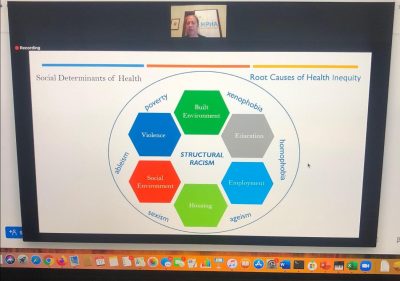Rapid infection rates, soaring unemployment and the election of a lifetime — 2020 is a year that has brought out the fault lines in nearly every aspect of American life, but especially health care.

Boston University’s School of Social Work held a panel discussion Nov. 17 on health care equity in the United States and the steps that should be taken during the next four years.
The seminar was moderated by SSW Dean Jorge Delva and hosted by the school’s Center for Innovation in Social Work and Health.
Delva said CISWH aims to expand the role of social work in health care and public health policy, and hopes the incoming presidential administration leads those policy decisions.
“With the news that Joe Biden and Kamala Harris are the president- and vice president-elect, respectively,” Delva said, “I’m hopeful that the programs and policies that will be implemented in the future will be more in line with the values of social work and public health.”
Rebekah Gewirtz, executive director of the Massachusetts Chapter of the National Association of Social Workers, said racial equality in public health must be tackled in the next few years.
Gewirtz said there are six crucial policy areas: criminal justice, economics, education, environment, health care and politics. She shared a number of examples of policy change, such raising welfare grant advocacy, making early education affordable and enacting a Massachusetts Green New Deal.
There are specific health inequalities that must be addressed in the current health care system, Gewirtz said, including access to mental health care, LGBTQ equal rights and Medicaid for all.
NASW passed a bill in 2019 protecting mental health visits in the Commonwealth, one of several legislative wins, Gewirtz said during the talk. But problems arise, she said, when insurance companies pull coverage and harm those who need insurance the most.
“Maybe five years down the road, an insurance company would say, ‘Actually, we’re not approving that anymore, and we’re going to pull back the money,’” Gewirtz said. “This discourages people from being on insurance, it discourages people from accepting insurance. And that hurts low-income people, vulnerable people, people who are living in poverty.”
Carlene Pavlos, executive director of the Massachusetts Public Health Association, said current issues on the health equity front, specifically social issues, have been pressing the U.S. in recent months.
“More than 47 percent of people in this country voted for someone with overtly racist views and policies, with no comprehensive national plan to address the COVID-19 pandemic,” Pavlos said, “and with a true resistance to relinquishing power in alignment with our basic historic standards of democracy.”
SSW associate professor Dawn Belkin Martinez said in an interview the current pandemic has exposed cracks in U.S. public health policies, and that marginalized demographics are more likely to fall into those cracks.
Black people are two times as likely to die from the coronavirus than their white counterparts, Belkin Martinez said, and Latinos make up a large portion of frontline workers, which makes them more susceptible to COVID-19.
“The data is not anything surprising,” Belkin Martinez said, “because what it’s doing is unmasking the mass inequalities in terms of access and care in health for people of color.”
Leen Arnaout, a senior in the College of Engineering, shared in an interview that to promote equality under the current U.S. health care system takes uprooting the “entire social structure” to work on making care more affordable.
“Systemic racism has been deeply rooted in our American communities,” Arnaout said, “and COVID-19 basically just highlighted those.”
Pavlos, meanwhile, said she is optimistic about the prospect of the next presidential administration’s ability to tackle these inequities and handle the pandemic.
“I feel this sense of euphoria,” Pavlos said, “that there’s going to be both science sitting at the table and a belief that this can help improve our response to COVID and that there’s going to be a national plan.”
























































































































